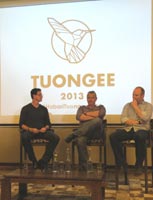Being an anti-conference, delegates were encouraged by facilitator Rowan Belchers (@ThePeoplePro) from The Fresh Group, to participate and engage by asking questions and voicing their opinions on what was being discussed.

Mobile panel: Marc Herson, Tim Bishop and Angus Robinson
click to enlargeThe mobile panel, consisting of three mobile/digital whizzes, Angus Robinson from Native (@angusrobinson), Tim Bishop from Deloitte Digital (@TimBishopSA) and Marc Herson from 2go (@marcherson), discussed what we have heard time and time again: in Africa, mobile is most certainly not where it can be in terms of being used optimally for advertising purposes.
Mobile shouldn't be something you simply add on to your campaign or strategy as an after-thought. It's a very unique and niche advertising platform and should be well thought through.
All about engagement
A question from the delegates and probably many others in the industry is however, how does one generate revenue from mobile campaigns? According to Robinson, it's the publishers who give their audience exactly what they want who are able to see a profit. It's not simply about impressions and clickthroughs but rather about something we've been hearing of for ages - engagement. And how do you get an engaged consumer/reader? He shared Native's Digital Engagement model: Value + relevance = engagement.
Herson stated that sometimes the definition of engagement needs to be revised as engagement mostly happens off the device - it's not about the number of clicks, because in Africa for example, a person may click but the chances of them actually arriving on the landing page is very rare due to slow networks and other factors.
Another tricky one for marketers is how to convince a brand who has never used mobile as an advertising platform to go mobile? Bishop's advice is to remember that mobile is a much more personal platform than any other since it's always in a person's hands and face, so if you have a bad product or lame campaign, don't go there. Robinson believes in testing it on a portion of the audience to gain insight into whether or not it will be successful; and according to Herson, it's about education. Understand who is using which types of platforms before trying to persuade them to go mobile.
Bishop also made a very true statement saying that mobile has always been a paid-for platform whereas the web has always been free - that is the missed opportunity right there. The aim of mobile shouldn't be to try to be a "smaller" internet - mobile is completely different to the web.
Key insights
Some key insights taken from the mobile panel discussion which may be of help when planning mobile campaigns:
- the way you start is very important
- avoid low-budget, last-minute campaigns
- the starting point for a mobile campaign should be great ideas, not the tech aspects
- mobile is completely different to the web - it's not just a "smaller" internet
- learn while you make mistakes - test on small groups of your customer base and get feedback rather than not doing anything at all
- get the basics right and don't over-complicate things - people want the simplest stuff
- mobile can be used in very simple but effective ways
- remember that in Africa you can't do very complicated things due to certain restrictions
- you can target much more effectively on mobile
- the biggest mistake you can make is not knowing who your audience is
- integration doesn't mean doing everything, but rather integrating the best/most suited platforms for the specific client's needs
- running polls before, during and after your campaign can give you great insights into whether your campaign was successful or not.
At the end of the day we have moved from mobile to mobility - it's not about the device as such, as Robinson stated. We get too bogged down in the device aspect and we forget about the benefit that mobile offers people and how it can impact their lives.
For more:

















































